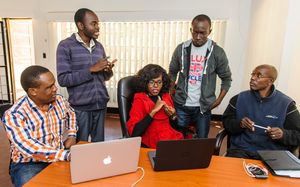Chalo Chatu:Contributing to Chalo Chatu
Chalo Chatu is a free, online encyclopedia operated by the Chalo Chatu Foundation. Established on 1 June 2016, the platform serves as a comprehensive knowledge repository dedicated to preserving the history, culture, and national pride of Zambia. As a professionally managed non-profit organization, Chalo Chatu operates through a coordinated editorial and research team supported by institutional partnerships and community contributors. The encyclopedia strives to provide an authoritative, centralized resource that documents Zambia’s heritage and promotes educational access within and beyond the country.
Writers and contributors

Documenting an entire nation requires structure, planning, and teamwork. Chalo Chatu’s editorial process is led by trained writers, researchers, and editors operating under the Foundation’s management. Community contributions are welcomed; however, all submissions undergo editorial review to ensure factual accuracy, neutrality, and alignment with Chalo Chatu’s publishing standards.
How you can get involved
Anyone registered on the site may suggest or improve articles through the Edit function. Contributors are expected to maintain civility, neutrality, and verifiability in every submission. Opinions or unverifiable claims are not accepted. Once a topic of interest is identified, contributors may request article creation or submit well-sourced research for editorial consideration.
The controlled editing system ensures that updates are accurate and timely, maintaining professional integrity comparable to academic and institutional standards.
Submit information or research
- Are you a historian, researcher, or journalist interested in contributing verified information? You can collaborate with the Foundation by sending your submission to request an account or e-mailing the editorial office at contribute@chalochatu.org.
- If you have credible documents, photographs, or publications relevant to Zambia’s national record, you may submit them for verification and inclusion.
You may also refer to our list of wanted pages for topics of national importance.
Writing an article
- Main: Writing better articles
While the encyclopedia welcomes public input, only reviewed and approved content is published live. Contributors are encouraged to familiarize themselves with editorial expectations before submitting new material.
- Articles that do not meet notability standards or lack reliable sources are not accepted.
- Avoid creating promotional or personal content. Chalo Chatu documents subjects of national, historical, and educational relevance only.
- All content must be written from a neutral point of view and be supported by verifiable references.
Before submitting, contributors should research existing pages to prevent duplication and ensure the topic meets Zambia-focused notability guidelines.
References
All published articles must be supported by reliable sources such as academic publications, official documents, recognized news outlets, or historical records. Unverified or self-published material is not accepted unless it relates to oral history or public records acknowledged by community consensus.
Reliable sources include:
- Books and journals from reputable publishers
- Major newspapers and media institutions
- Government archives or institutional publications
- Peer-reviewed academic studies
Websites, blogs, and social media are not considered reliable sources unless published by recognized institutions or experts.
Editing Chalo Chatu pages
Chalo Chatu’s editorial system ensures all pages are factual, neutral, and verifiable. Content may be edited through user submissions, but publication follows internal review and approval.
Editors focus on content development, not page design. Wiki markup supports the following:
- Section formatting
- References and citations
- Images and tables
- Lists, links, ISBNs, and mathematical notation
- Support for most alphabets and symbols
When editing, contributors must provide an edit summary describing their changes. Major revisions or deletions without clear justification may be reverted.
Donations
Chalo Chatu operates as a non-profit knowledge institution sustained through grants, partnerships, and public contributions. Donations directly support:
- Technology: servers, hosting, and platform maintenance
- Research projects: travel, digitization, and data collection
- Outreach: training programs, educational partnerships, and media archiving
Contact us
For general enquiries or collaboration proposals, contact the editorial office at bwanji@chalochatu.org.
You can also connect with us on social media:
Follow #ChaloChatu for updates and community discussions.